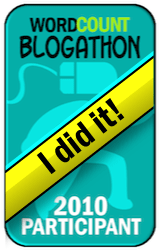It started with a simple tweet, which I retweeted:
Then a conversation between the two of us followed:
He mentioned "bike." And I was hooked. I took the free class on Saturday afternoon. It lasted three hours and was such a blast. I returned to Twitter that evening and chatted with The Torch Theatre some more, promising to return for a class in the fall. My summer schedule is too up in the air to sign up now. But I will be back. Here's a bit of what happened in the free class. Wish I had photos...
We did the warm-up exercises where you learn how important eye contact is to improvisational acting, and also how to work together as a team. This is where you practice saying, "Yes, and..." In improv, you learn how to accept another person's idea and roll with it, in order to keep a scene alive. If you disagree or don't want to do what the suggestion calls for, the scene ends. There's no where else to go. And what is the fun of that? In general, this is a great life lesson.
For fun, try these improv games at home with your family and friends:
Zip, Zap, Zop (and other variations)
Stand in a circle. One player begins by pointing with his hands to the player on his right, makes eye contact, and says, "Zip." Now that player turns to his player on the right, points, makes eye contact, and says, "Zap." The next player then points to the player in the circle on his right, makes eye contact, and says, "Zap." You keep doing this till you're comfortable, and then you can start pointing to anyone in the circle. It no longer has to be the person on your right. It can be the person on your left or the person across from you, anyone at all. You just keep shouting out, "Zip, Zap, Zop," trying to keep up with the words and the rhythm, all the while making that eye contact so people are clear who's being called upon. It becomes a loud mess of yelling, laughing, getting confused, but eventually you get it. The game helps you practice making eye contact, maintaining a sense of focus, and accepting your role in the game.
Yes, let's!
For this exercise, be prepared to get silly. The game starts by someone yelling out some call to action. It has to start with "Let's." So it could be something like, "Let's eat pizza!" And the group yells back in union, "Yes, let's." And everyone immediately starts miming the act of eating pizza until another person calls out a different action. It could be anything. In our game, people called out things like, "Let's swim with the sharks!" and "Let's eat cotton candy!" and "Let's walk the dog!" After each request, we all yelled back, "Yes, let's!" and then proceeded to do that action. Since the stage at this theater is very small, the ten of us -- all strangers to each other -- were crowed in tightly together. It was sheer madness and a ton of fun. Lots of laughing out loud. Lot's movement. Lot's of up and down. You never knew what the next person was going to call out. But whatever it was, we said, "Yes, let's!" and did it.
What are you doing?
Here's a game that will teach you how to think fast and be in the moment. You all stand in a line against the wall. One player at the head of the line goes to the center of the stage and begins miming an action. The next person in line walks over and asks, "What are you doing?" Instead of saying what it looks like he's doing, that person makes something up that is entirely different. So maybe he's miming folding laundry. But instead of saying he's folding laundry, he'd say he's changing a light bulb. Then he leaves and that new person starts to mime changing a light bulb. The next person in line comes up to him and asks, "What are you doing?" The person miming changing the light bulb says he's doing something else. Maybe he'll say, "I'm painting a masterpiece." It doesn't matter what you say, you're just learning how to think fast on your feet and convincing the next person to commit. So that next person proceeds to "mime painting a masterpiece," when the next person in line comes up to him and asks, "What are you doing?" The game goes on and on till everyone has a chance to play at least once.
Emotion Scenes
We also engaged in some scene work with partners. In one scene game, we were assigned space on the stage for four emotions: anger, happiness, sadness, fear. Depending on whichever emotion we were going to express in the scene, we would stand in that area. The instructor called out a scene prompt (telling us who we were or where we were), and we had to take that prompt and apply the emotions to the scene. The point here was to learn how to express various emotions. You didn't have to go big, necessarily, but you did want to focus on what it might sound like, look like, and feel like to express anger, happiness, sadness and/or fear with another person on the stage. The objective was to see if you could make a connection with the scene partner. If you could make a connection with your scene partner, you could make a connection with your audience as well.
Body Parts
In one of the final scene games, we paired up with another person on stage to practice walking in peculiar ways. But first we were told to walk around the stage as we would normally. Then, the instructor told us to focus on a particular body part. So you might try walking around your home using your forehead first, or your elbows first, or your knees first. Once we did that, we were asked questions about what that felt like and which body part we might like to explore as a character. While the walking looked hilarious on stage, the resulting answers were interesting and insightful. One young man, who was told to walk around on stage using his forehead, thought it made him feel like a nerd or a scientist. When I walked around stage using my elbows, I felt at first like cowboy, and that morphed into feeling a bit bird-like. Since the elbows are more flexible and can move in more ways than other body parts, it seems like it could be interesting to explore just where such movement would take creativity.
Which brings me to my point of why I wanted to take the class in the first place...I was looking for an artist date with myself. I felt the need to explore creative pursuits in a more physical manner, something that would go beyond writing. Improvisational acting is certainly one way to achieve that.
What are some ways you've been exploring your creative spirit lately?
Sunday, June 3, 2012
Subscribe to:
Post Comments (Atom)














3 comments:
I've been eyeing an improv class in Portland, but the dates have never lined up. Seeing this recap of your class, I am going to have bump it up my list!
Please do, Patrick. I've taken improv classes before -- another thing I did to move me through my divorce, only I took it with the specific need to use improv to build back up my self-esteem. It worked like a charm. I'm pretty sure you will have fun, and it's such a stress reliever as well. Besides, where else do you get a chance to act like a complete fool and no one else will care?
very interesting!
Post a Comment